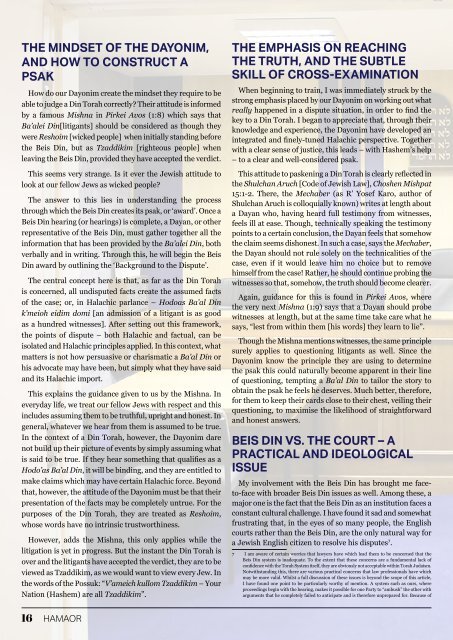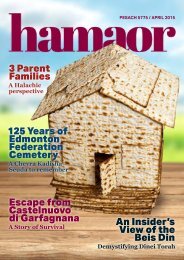HAMAOR MAGAZINE PESACH 5775
The Pesach edition of HaMaor magazine from the Federation for 5775 / April 2015
The Pesach edition of HaMaor magazine from the Federation for 5775 / April 2015
Create successful ePaper yourself
Turn your PDF publications into a flip-book with our unique Google optimized e-Paper software.
THE MINDSET OF THE DAYONIM,<br />
AND HOW TO CONSTRUCT A<br />
PSAK<br />
How do our Dayonim create the mindset they require to be<br />
able to judge a Din Torah correctly? Their attitude is informed<br />
by a famous Mishna in Pirkei Avos (1:8) which says that<br />
Ba’alei Din[litigants] should be considered as though they<br />
were Reshoim [wicked people] when initially standing before<br />
the Beis Din, but as Tzaddikim [righteous people] when<br />
leaving the Beis Din, provided they have accepted the verdict.<br />
This seems very strange. Is it ever the Jewish attitude to<br />
look at our fellow Jews as wicked people?<br />
The answer to this lies in understanding the process<br />
through which the Beis Din creates its psak, or ‘award’. Once a<br />
Beis Din hearing (or hearings) is complete, a Dayan, or other<br />
representative of the Beis Din, must gather together all the<br />
information that has been provided by the Ba’alei Din, both<br />
verbally and in writing. Through this, he will begin the Beis<br />
Din award by outlining the ‘Background to the Dispute’.<br />
The central concept here is that, as far as the Din Torah<br />
is concerned, all undisputed facts create the assumed facts<br />
of the case; or, in Halachic parlance – Hodoas Ba’al Din<br />
k’meioh eidim domi [an admission of a litigant is as good<br />
as a hundred witnesses]. After setting out this framework,<br />
the points of dispute – both Halachic and factual, can be<br />
isolated and Halachic principles applied. In this context, what<br />
matters is not how persuasive or charismatic a Ba’al Din or<br />
his advocate may have been, but simply what they have said<br />
and its Halachic import.<br />
This explains the guidance given to us by the Mishna. In<br />
everyday life, we treat our fellow Jews with respect and this<br />
includes assuming them to be truthful, upright and honest. In<br />
general, whatever we hear from them is assumed to be true.<br />
In the context of a Din Torah, however, the Dayonim dare<br />
not build up their picture of events by simply assuming what<br />
is said to be true. If they hear something that qualifies as a<br />
Hodo’as Ba’al Din, it will be binding, and they are entitled to<br />
make claims which may have certain Halachic force. Beyond<br />
that, however, the attitude of the Dayonim must be that their<br />
presentation of the facts may be completely untrue. For the<br />
purposes of the Din Torah, they are treated as Reshoim,<br />
whose words have no intrinsic trustworthiness.<br />
However, adds the Mishna, this only applies while the<br />
litigation is yet in progress. But the instant the Din Torah is<br />
over and the litigants have accepted the verdict, they are to be<br />
viewed as Tzaddikim, as we would want to view every Jew. In<br />
the words of the Possuk: “V’ameich kullom Tzaddikim – Your<br />
Nation (Hashem) are all Tzaddikim”.<br />
THE EMPHASIS ON REACHING<br />
THE TRUTH, AND THE SUBTLE<br />
SKILL OF CROSS-EXAMINATION<br />
When beginning to train, I was immediately struck by the<br />
strong emphasis placed by our Dayonim on working out what<br />
really happened in a dispute situation, in order to find the<br />
key to a Din Torah. I began to appreciate that, through their<br />
knowledge and experience, the Dayonim have developed an<br />
integrated and finely-tuned Halachic perspective. Together<br />
with a clear sense of justice, this leads – with Hashem’s help<br />
– to a clear and well-considered psak.<br />
This attitude to paskening a Din Torah is clearly reflected in<br />
the Shulchan Aruch [Code of Jewish Law], Choshen Mishpat<br />
15:1-2. There, the Mechaber (as R’ Yosef Karo, author of<br />
Shulchan Aruch is colloquially known) writes at length about<br />
a Dayan who, having heard full testimony from witnesses,<br />
feels ill at ease. Though, technically speaking the testimony<br />
points to a certain conclusion, the Dayan feels that somehow<br />
the claim seems dishonest. In such a case, says the Mechaber,<br />
the Dayan should not rule solely on the technicalities of the<br />
case, even if it would leave him no choice but to remove<br />
himself from the case! Rather, he should continue probing the<br />
witnesses so that, somehow, the truth should become clearer.<br />
Again, guidance for this is found in Pirkei Avos, where<br />
the very next Mishna (1:9) says that a Dayan should probe<br />
witnesses at length, but at the same time take care what he<br />
says, “lest from within them [his words] they learn to lie”.<br />
Though the Mishna mentions witnesses, the same principle<br />
surely applies to questioning litigants as well. Since the<br />
Dayonim know the principle they are using to determine<br />
the psak this could naturally become apparent in their line<br />
of questioning, tempting a Ba’al Din to tailor the story to<br />
obtain the psak he feels he deserves. Much better, therefore,<br />
for them to keep their cards close to their chest, veiling their<br />
questioning, to maximise the likelihood of straightforward<br />
and honest answers.<br />
BEIS DIN VS. THE COURT – A<br />
PRACTICAL AND IDEOLOGICAL<br />
ISSUE<br />
My involvement with the Beis Din has brought me faceto-face<br />
with broader Beis Din issues as well. Among these, a<br />
major one is the fact that the Beis Din as an institution faces a<br />
constant cultural challenge. I have found it sad and somewhat<br />
frustrating that, in the eyes of so many people, the English<br />
courts rather than the Beis Din, are the only natural way for<br />
a Jewish English citizen to resolve his disputes 7 .<br />
7 I am aware of certain worries that lawyers have which lead them to be concerned that the<br />
Beis Din system is inadequate. To the extent that these concerns are a fundamental lack of<br />
confidence with the Torah System itself, they are obviously not acceptable within Torah Judaism.<br />
Notwithstanding this, there are various practical concerns that law professionals have which<br />
may be more valid. Whilst a full discussion of these issues is beyond the scope of this article,<br />
I have found one point to be particularly worthy of mention. A system such as ours, where<br />
proceedings begin with the hearing, makes it possible for one Party to “ambush” the other with<br />
arguments that he completely failed to anticipate and is therefore unprepared for. Because of<br />
16 <strong>HAMAOR</strong>



